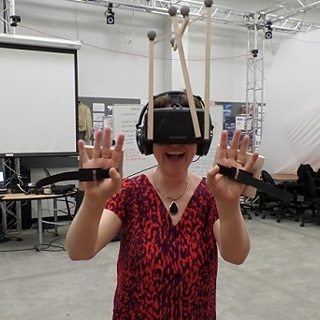
The latest short 360 video from 91Čȱ¬ News allows you to stand at the heart of the Large Hadron Collider (LHC), 100 metres under the French/Swiss border. And as you look round and appreciate its magnificent scale, you can learn about the experiments that take place there. It’s a 360 video that truly justifies the use of 360, enabling you to understand and appreciate the LHC in a new way.
As part of 91Čȱ¬ Click's , 91Čȱ¬ R&D and helped to create a standalone three-minute 360 tour of CERN, with graphic explainers and labels, and 3D models provided by .
Just as early pioneers in TV news had to work out how to tell stories on television, we are now starting to understand what's possible with 360 and develop new formats for storytelling. The 360 CERN explainer points the way to the future of 360 news. It incorporates the principles we’ve established for VR/360 work for news – .
- from day
It can be viewed on a phone or tablet via the YouTube app, in a browser, or via a VR headset. Its elements are:
- Unique and stunning 360 footage inside the Large Hadron Collider shot by Stephen Beckett
- An informative, informal commentary from Spencer Kelly (delivered in a style more familiar to radio than TV)
- Graphic explainers, including light beams illustrating how proton beams move through the tunnels
- Incorporation of CGI elements using 3D models provided by CERN to show the collision moment
The graphic overlays were created by VR production company . First the 360 footage needed to be stabilised (the tunnel shot is a handheld walking shot and so was a bit wobbly - even though you can see from his expression how hard Stephen Beckett was concentrating on holding it steady!). Some stitching issues were ironed out in a complex 360 post-production pipeline. However, a moving shot like the one in the tunnel, in an environment that cannot be controlled, is inevitably going to have some stitch errors. But the immediacy and remarkable nature of the footage should more than compensate for a few technical imperfections.
Adding 2D & CGI (computer-generated imagery) overlays in a moving 360 shot is not a simple task, nor easy to explain in non-technical language. The 360 footage first needed tracking data so that we could create solid anchors, thereby allowing various elements to be tracked in. To do this you have to calculate where the physical 360 camera was placed and then replicate that camera positioning and movement within a 3D environment. Then the 2D text overlays and the CG light particles which were placed within the 3D space, based upon the tracking data.
Getting the labels right took more editorial work than I’d originally anticipated, especially in a scientific explainer which called for the highest accuracy standards. Our initial idea was to include lots of labels, but many of these were so technical that they would have confused and distracted viewers. We thought carefully about how to provide a memorable but simple explanation of the LHC through the graphics. They were timed to work with the commentary, but also designed to provide stand alone explanations. Ensuring the labels remained accurate in a 360 space, required careful fact checking, and sometimes a change of wording for clarity. For example,working out exactly where to place a label like “Detector is 15m in diameter and weighs 14,000 tonnes” can take careful thought. And during the tunnel shot we initially included more detailed facts about the filaments, but concluded that this was over-complex and didn’t make sense without further explanation, so we focused on the magnets.
So what did 91Čȱ¬ the audiences make of “Step inside the LHC”? There were nearly 500,000 views on YouTube in the first three days. And the comments were overwhelmingly positive, such as: "Best 360 video I've seen so far, amazing work, genuinely thank you showing, in such great and immersive detail, the inside of one of the most amazing places on earth".
The video was also featured by the Daily Mail, who described it as a .
Above all, this 360 video provides a great example of how collaborative projects - with partners across the 91Čȱ¬ and beyond - can push both creative and technical boundaries and invent new forms of content that delight audiences. You can read a blog by Stephen Becket about how the entire 360 Click show was filmed and edited on the . And while we were busy creating the content, News Labs took on the tricky task of working out a way to embed the 360 YouTube player – at least for viewers on desktop.
- -
- More on Virtual Reality and 360 Video:
- from day
